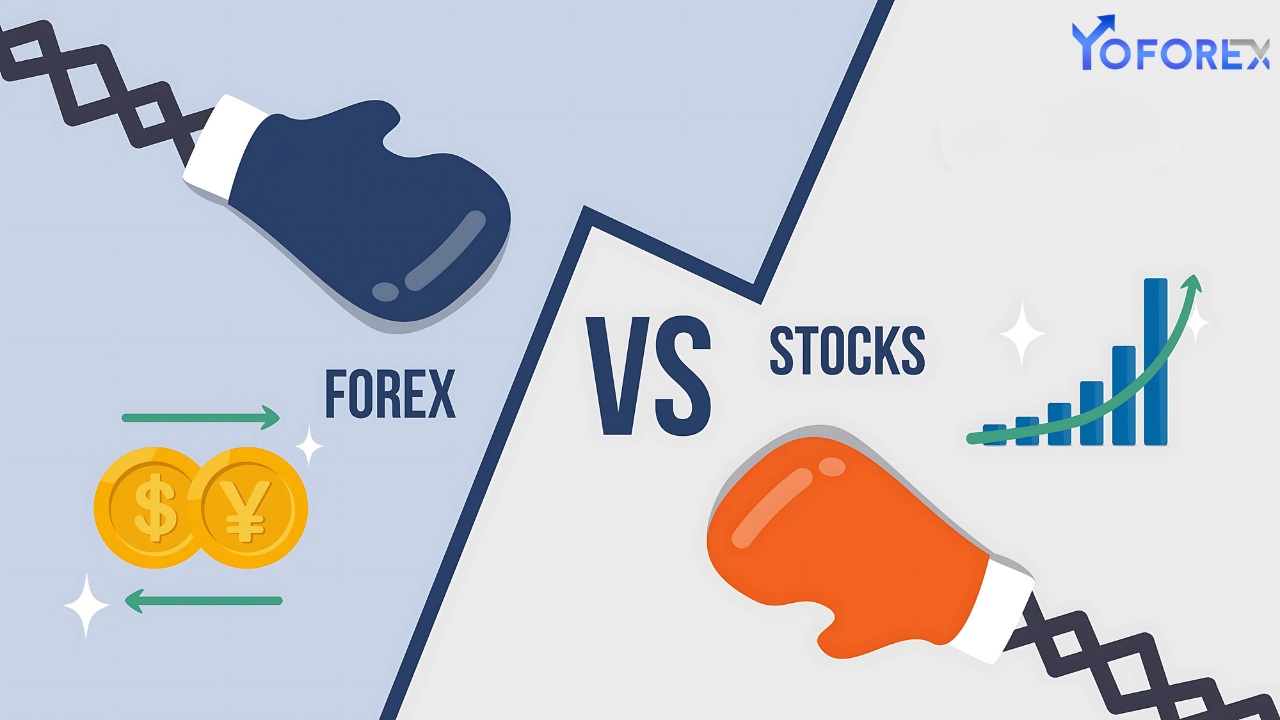When it comes to trading and investing, forex (foreign exchange) and the stock market are two of the most popular options. While both markets offer the potential for financial gains, they operate under vastly different frameworks, attracting different types of investors. Understanding the similarities and differences between forex trading and stock market investing can help you decide which is better suited to your financial goals, risk tolerance, and trading style.
What is Forex Trading?
Forex trading involves the exchange of one currency for another in a global decentralized marketplace. It’s the largest financial market in the world, with a daily trading volume exceeding $6 trillion.
Key Features of Forex Trading:
- Operates 24 hours a day, five days a week.
- Highly liquid market with low transaction costs.
- Primarily focused on major currency pairs, such as EUR/USD, GBP/USD, and USD/JPY.
- Leverage is commonly used, allowing traders to control large positions with a relatively small amount of capital.

What is Stock Market Investing?
The stock market is a centralized platform where investors buy and sell shares of publicly traded companies. It provides a way for companies to raise capital and for investors to gain ownership in businesses.
Key Features of Stock Market Investing:
- Trades during specific hours based on the stock exchange’s operating schedule.
- Investors can focus on individual stocks or index funds.
- Offers opportunities for long-term growth through dividends and capital appreciation.
- Regulatory oversight by organizations like the SEC (U.S.) ensures transparency.
Key Differences Between Forex and Stock Markets
While both markets offer trading opportunities, they differ significantly in structure, strategies, and potential outcomes. Here’s a detailed comparison:
1. Market Hours
- Forex: The forex market operates 24 hours a day from Monday to Friday, enabling traders to participate across global time zones. This continuous operation is divided into three main trading sessions: Asian, European, and North American.
- Stock Market: The stock market operates within set hours determined by the exchange. For example, the New York Stock Exchange (NYSE) is open from 9:30 AM to 4:00 PM EST. Some exchanges offer after-hours trading, but liquidity during these times is limited.
Advantage: Forex’s round-the-clock availability provides more flexibility for traders.
2. Liquidity
- Forex: With trillions of dollars traded daily, forex is the most liquid market in the world. High liquidity ensures that trades can be executed quickly, with minimal price slippage.
- Stock Market: Liquidity in the stock market varies depending on the stock. Large-cap stocks like Apple and Microsoft are highly liquid, while small-cap or penny stocks may have limited trading volumes.
Advantage: Forex offers consistently high liquidity across major currency pairs.
3. Leverage
- Forex: Leverage is a defining feature of forex trading. Brokers often offer leverage ratios as high as 50:1 or even 100:1, allowing traders to control significant positions with minimal capital.
- Stock Market: Leverage in stock trading is more restricted, typically capped at 2:1 for retail investors in margin accounts. Excessive leverage in forex can amplify both gains and losses, making it a double-edged sword.
Advantage: Forex offers higher leverage, but this comes with increased risk.
4. Market Influences
- Forex: Currency values are influenced by macroeconomic factors such as interest rates, geopolitical events, inflation, and central bank policies. Traders must stay updated on global economic developments.
- Stock Market: Stock prices are driven by company performance, industry trends, and broader economic conditions. Factors like earnings reports, mergers, and analyst ratings play a significant role.
Advantage: Stock market influences are more localized, while forex requires a broader understanding of global economics.
5. Volatility
- Forex: Currency pairs, particularly exotic ones, can exhibit high volatility due to leverage and geopolitical events. Volatility presents opportunities but also increases risk.
- Stock Market: Volatility in the stock market is generally lower, but certain stocks or sectors can experience significant price swings, especially during earnings season.
Advantage: Forex offers more opportunities for short-term traders, while the stock market may suit those seeking stability
6. Trading Costs
- Forex: Trading costs in forex come in the form of spreads (the difference between the bid and ask price) and, in some cases, commissions. Spreads for major currency pairs are typically very low.
- Stock Market: Stock trading costs include commissions (though many platforms now offer commission-free trades), bid-ask spreads, and fees for extended trading hours.
Advantage: Forex generally has lower costs for frequent traders.
7. Complexity
- Forex: The forex market’s limited focus on currency pairs simplifies the decision-making process, but traders need to grasp economic indicators and geopolitical dynamics.
- Stock Market: With thousands of stocks to choose from, investors need to conduct extensive research to build a diversified portfolio.
Advantage: Forex offers a narrower range of choices, making it less overwhelming for beginners.
8. Investment Horizon
- Forex: Forex trading is typically short-term, with traders focusing on intraday or swing trades. Scalping is also common.
- Stock Market: The stock market caters to both short-term traders and long-term investors. Many people use stocks to build wealth over decades.
Advantage: The stock market provides more options for long-term investment strategies.
Which Market is Right for You?
Choosing between forex and the stock market depends on your goals, risk tolerance, and trading style.
- Forex is ideal if you:
- Prefer high liquidity and flexible trading hours.
- Are comfortable with leverage and short-term trading.
- Have a good understanding of global macroeconomics.
- The stock market is ideal if you:
- Seek long-term growth and diversification.
- Prefer lower leverage and less volatility.
- Are interested in owning shares of companies.
Conclusion
Forex trading and stock market investing are two distinct paths to financial success, each with its own set of advantages and challenges. Understanding their differences can help you make an informed decision and align your strategy with your financial objectives. Whether you choose forex, stocks, or a combination of both, success requires discipline, research, and a clear plan.

